Tabernacles in the Millennium
After Messiah returns to Earth as King and establishes His Messianic Kingdom, with its center at the gloriously rebuilt Temple in Jerusalem (Zech. 6:12–15; 8:3; Ezek. 40—48; Mt. 19:28; 25:31–32; Rev. 20:4), Israel’s festival calendar will resume as predicted by the prophet Ezekiel: “They shall keep my laws and my statutes in all mine assemblies; and they shall hallow my sabbaths”
(Ezek. 44:24; cf. Zeph. 3:18). Of the seven feasts of the Lord, only the Feast of Tabernacles has its typical fulfillment in the Millennium, when Israel finally will enjoy safe territorial boundaries and will be a blessing and witness to the Gentile nations (Gen. 12:2–3; 15:18; Isa. 2:2–4; 60:3; Jer. 32:37–41; 33:16; Ezek. 37:25–28).
The term tabernacles (Hebrew, sukkot; Greek, skene) involves God’s promise to return to Earth and “tabernacle,” or dwell, with Israel in a way never before experienced in history:
Thus saith the LORD: I am returned unto Zion, and will dwell in the midst of Jerusalem (Zech. 8:3).
I . . . will set my sanctuary in the midst of them for evermore. My tabernacle also shall be with them (Ezek. 37:26–27).
The LORD of hosts shall reign in Mount Zion, and in Jerusalem, and before his ancients gloriously (Isa. 24:23).
Although this “tabernacling” means God’s presence again will inhabit the Temple, the prophet Isaiah indicated it will do so in a greater way than ever before:
And the LORD will create upon every dwelling place of Mount Zion, and upon her assemblies, a cloud and smoke by day, and the shining of a flaming fire by night; for upon all the glory shall be a defense [canopy] (Isa. 4:5).
The word defense, or canopy (Hebrew, huppah), of God’s glory in this verse is stated in the next verse to be a “tabernacle” (Hebrew, sukkah) from the heat by day and refuge and protection from the storm and the rain. This wording connects Israel’s past deliverance (from Pharaoh in Egypt) and temporary, man-made shelters (Lev. 23:42–43) with Israel’s future deliverance (from Antichrist in the Tribulation) and permanent, Godgiven sanctuary. Ezekiel depicts the method of this future “tabernacling” with the return of God’s Shekinah Glory to the Temple (Ezek. 43:1–7); and Jeremiah reveals its result as Jerusalem becomes “the throne of the LORD, and all the nations shall be gathered unto it” (Jer. 3:17).
Indeed, later Jewish interpretation saw in “tabernacles” not only the Israelites’ temporary shelters in the wilderness but also the divine sukkah (the Shekinah), which had “brought them out of the land of Egypt” (Lev. 23:43). Thus they joined the Feast of Tabernacles to the promise that God’s presence will dwell with Israel in the future as it had in the past (Hag. 2:5–9; cf. Zeph. 3:15).
In a similar way, Jesus made this connection in His own Person as “the Word was made flesh, and dwelt [tabernacled] among us” (Jn. 1:14). At the Feast of Tabernacles, Jesus used two of the feasts’ Messianic symbols—the water libation and the light of the candelabras—to illustrate the fulfillment in Himself of the promised restoration of Israel under Messiah in the Millennial Age. (See Peter Colón’s article, p. 12.)
Sukkot also celebrates God’s provision of refuge in the wilderness and recalls His promise to rescue Israel at the Time of Jacob’s Trouble (Tribulation period, Jer. 30:7) and restore the nation in the future Kingdom of Messiah. At a special ceremony called the water-drawing festival, water from the Pool of Siloam was carried to the Temple and poured over the corner of the altar, a ritual based on an oral tradition dating to the time of Moses (Ta’anit 3a, Succot 44b, 44a). The ritual’s significance was both symbolic and prophetic. Its symbolic purpose was a prayer for rain since the summer was about to end and the rainy season begin. This prayer demonstrated Israel’s dependence on the Lord, an act of faith that will be required of all nations in the Millennium (Zech. 14:16–19). Its prophetic purpose was Messianic: It looked forward to the outpouring of the Ruach Ha-Kodesh (the Holy Spirit) on Israel and the nations under the New Covenant in the Kingdom Age (Ezek. 36:27; Joel 2:28). Then Israel’s return to blessing will include the spiritual instruction and blessing of the nations, who will join Israel in the ongoing celebration of Sukkot (Zech. 14:16–19). In fact, the Scripture read in the synagogue on the Sabbath during the Feast of Tabernacles is Ezekiel 38, which deals with the future battle of Gog and Magog, in which the Lord miraculously preserves Israel in an end-times war.
The word tabernacle also recalls the famous prophecy of the restoration of the Davidic Kingdom (“the tabernacle of David”) given in Amos 9:11–12:
In that day will I raise up the tabernacle of David that is fallen, and close up the breaches of it; and I will raise up his ruins, and I will build it as in the days of old, That they may possess the remnant of Edom, and of all the nations, which are called by my name, saith the LORD who doeth this.
The fulfillment of this prophecy, as explained in Acts 15:14–18, will occur after the full complement of Gentiles has been grafted into the “olive tree,” through faith, at the completion of the Church Age and in keeping with the blessing of the Gentiles in the Abrahamic Covenant (Rom. 11:25). Gentiles who come to faith in the Jewish Messiah during the Time of Jacob’s Trouble (see Mt. 25:34–40) will join redeemed Jewish people in the true worship of God.
The apostle John specifically used the imagery of the Feast of Tabernacles to describe Gentile Tribulation martyrs. He depicted them with palm branches, serving in His Temple while God dwells among them and Jesus guides them to “living fountains of waters” (Rev. 7:9–17). Such Gentile inclusion was anticipated by the alternate name for the feast, “the Feast of Ingathering” (Ex. 23:15–16), and was demonstrated during the feast in second Temple times when Jewish men participated in a Temple ritual where 70 sacrifices were offered for the sins of the nations that had come from the sons of Noah. These Gentile nations oppressed Israel, but the prophets included them in the future worshiping community—evidence of the changed conditions under Messiah’s New Covenant (Jer. 31:31–34).
For example: ”Many nations shall be joined to the LORD in that day, and shall be my people” (Zech. 2:11). Isaiah described the Millennial Temple as “an house of prayer for all peoples” (Isa. 56:7; cf. Mt. 21:13; Mk. 11:17; Lk. 19:46) to which all nations of the earth will come to learn the ways of the Lord (Isa. 2:2–3; 60:3; 62:2), to behold God’s glory (Isa. 60:3; 62:2; 66:18), to offer sacrifices (Isa. 56:6–7; 66:20), and to pay material tribute (Isa. 60:5; 66:18–19; cf. Hag. 2:7–8; Rev. 21:24).
This last reference to Gentile payment of tribute also is the only explicit mention of the Feast of Tabernacles in a Millennial context:
And it shall come to pass that every one that is left of all the nations which came against Jerusalem shall even go up from year to year to worship the King, the LORD of hosts, and to keep the feast of tabernacles (Zech. 14:16).
The conclusion of Zechariah 12—14 details the Gentile invasion of Jerusalem during the campaigns of Armageddon. In the immediate context, chapter 14 summarizes events that reveal prophetic aspects predicted by the feast: the advent of Messiah (vv. 3–4), the rescue and restoration of the Jewish remnant (v. 5; cf. Lk. 21:27–28), the experience of heaven-sent light and living water (vv. 7–8), the recognition of Messiah as universal King (v. 9), the transformation of Jerusalem (v. 10), and the gathering of the wealth of the Gentile nations (v. 14).
Those obligated to observe the Feast of Tabernacles in verse 14 are the remnants of the Gentile nations that previously were allied with the Antichrist in his war against the Holy City (Zech. 12:3, 9; 14:2, 12; cf. Rev. 19:19; Ps. 2:1–3). Although a deadly plague will destroy those armies (vv. 12–13), others will remain in these countries to appear before Messiah’s judgment seat at the conclusion of the conflict (Mt. 25:31–32). Individuals who sincerely embraced Messiah and His rule (Rev. 15:3–4)—as evidenced by their costly compassion toward the Jewish people during Antichrist’s vicious, anti-Semitic reign (Mt. 25:35–40)— will continue into the Millennial Kingdom. Nevertheless, under the rod-of-iron rule of Messiah (Ps. 2:9; Rev. 19:15), these nations will be required to demonstrate their allegiance to King Messiah by appearing annually at His Throne-City with tribute and material offerings (as tokens of appreciation for His divine provision). This act is in accordance with an ancient association of the Feast of Tabernacles, recognizing the king as God’s son, as alluded to in Psalm 2:10–12:
Be wise now, therefore, O ye kings; be instructed, ye judges of the earth. Serve the LORD with fear, and rejoice with trembling. Kiss [do homage to] the Son, lest he be angry, and ye perish from the way.
The ancient observance of the feast was also followed by a Levitically led ceremony of covenant renewal (Neh. 9:1–38) that reaffirmed national allegiance to the Lord (Neh. 10:29). Therefore, Zechariah 14:17–19 warns these nations that failing to observe the Feast of Tabernacles will be tantamount to spiritual and national rebellion. Because part of the ritual of the Feast of Tabernacles involves asking for rain (specifically the former rains), a punishment for nations that fail to appear annually in Jerusalem will be a withholding of rain—the very gift that made possible their gifts. Another punishment will be a plague. The warning specifically includes Egypt, whose natural productivity depends more on the gift of the Nile than the gift of rain and whose punishment to secure acknowledgment of Jehovah’s sovereignty at the time of the Exodus had been plagues.
The Feast of Tabernacles will unite these nations in a universal allegiance to Jesus as King Messiah, Sovereign Lord, and Judge (Zech. 14:9, 17; Isa. 2:4) and will provide an occasion for the Jewish people to fulfill their destiny as a light to the Gentiles in spiritual instruction to these nations (Isa. 2:3; Zech. 8:22–23; cf. Hab. 2:14).
Because the nations will become vassals of the Lord, they also will have the right to be called “His people,” just as He, as their suzerain, can be called “their God.” Isaiah elevates the nations of Egypt and Syria to covenantal status (Isa. 19:24–25), making them coparticipants in both the obligations and benefits of the Temple (Isa. 19:21; 56:6–8; 60:3; 66:20). The wealth of the conquered nations will accrue to Messiah’s Millennial Temple, filling it with abundance (a fitting contrast to Israel’s past, post-exilic poverty), increasing its splendor and value (Zeph. 3:20; Hag. 2:6–7, 22).
All that God has purposed and planned through His provision as Lord of His people finally will be fulfilled and celebrated in the Millennial Feast of Tabernacles. This realization should prompt us to acknowledge gratefully God’s gift of Messiah for us today and His constant “tabernacling” with us through His indwelling Holy Spirit (Mt. 28:20; Eph. 2:22). The future feast will demonstrate openly the unity of Jewish and Gentile people as they alike bow to Jesus as their Messiah and Lord. Today it encourages the Body of Messiah to foster greater unity among all its members before a watching world (Jn. 17:20–21; Eph. 2:14–18). As we do so in the present age, we honor the Lord of the feast who one day will tabernacle with us forever: “Behold, the tabernacle of God is with men, and he will dwell with them, and they shall be his people, and God himself shall be with them” (Rev. 21:3).
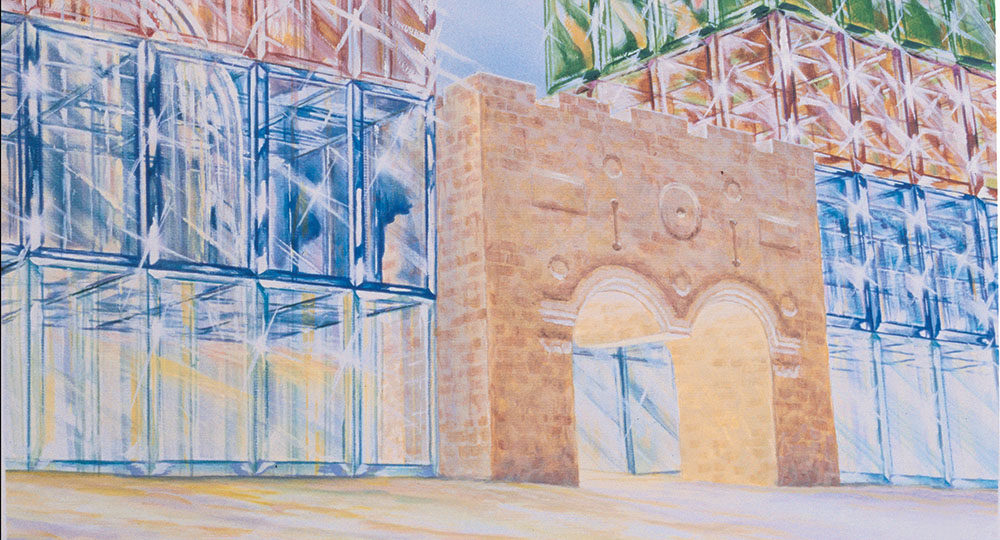

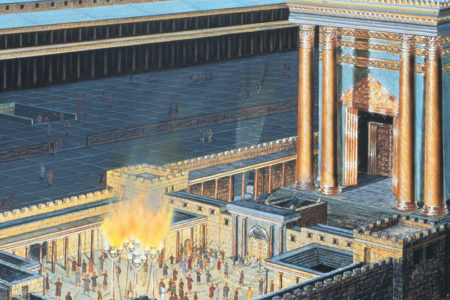
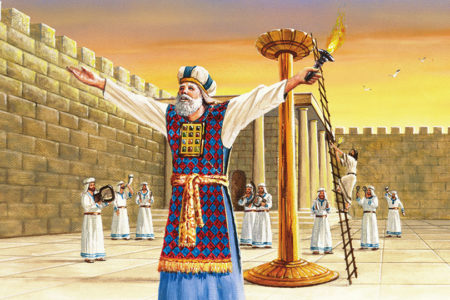
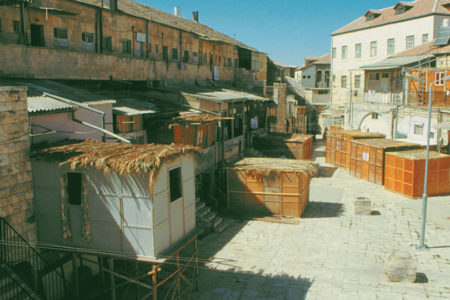
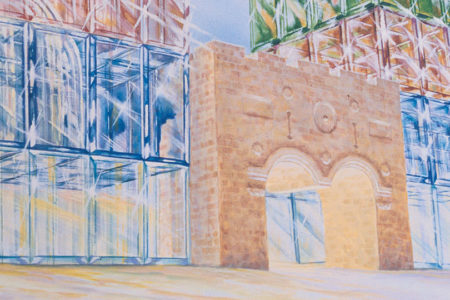


Thank you for such a clear explanation of the feasts of Yahweh. I’m grateful for having been given the grace of been opened spiritually. This article has given me a clear understanding of which I truly appreciate. May our Elohim bless you more.
As a goyim or gentile grafted to the Olive Tree, I am committed to observing Yahweh’s Feasts in preparation for Yahshua’s Reign during the Millennium, I am no longer separated from the citizenship of Yisrael and I have its constitution: The Torah, then I am also a Yisrelita. Thanks for this article
I had heard that people will have to pay homage to Jesus every year or they will get no rain so I did a search and found this article.
The verse I was looking for is Zechariah 14:17 “And it shall be, that whoso will not come up of all the families of the earth unto Jerusalem to worship the King, the Lord of hosts, EVEN UPON THEM SHALL BE NO RAIN.”
Thank you for writing this article.
What an exceptional and profound study on tabernacles. It makes me dig more into the depths of God’s Word. Thank you very much and may God keep on blessing you and your family.
This is an incredibly thorough article!
The many citations of scripture have provided me with a much greater understanding as to why I (a Messianic Christian) should continue to celebrate the Holy Feasts. This wonderful reference has aided me in my preparation for hostessing a Sukkot celebration. Thank you!
The feast of Tabernacles isn’t the only feast observed in the millennial kingdom. Ezekiel 45:21-24 says the feast of Passover will be observed as well. Otherwise, excellent article
Excellent teaching-thanks